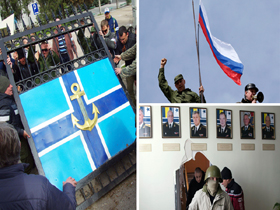Pro-Russian activists have taken control of the HQ of Ukraine’s navy in the Crimean city of Sevastopol.
Ukrainian navy chief Serhiy Hayduk has reportedly been detained and the Russian flag is flying over the base. Many Ukrainian personnel have left, reports the BBC.
On Tuesday, Crimean leaders signed a treaty with Moscow absorbing the peninsula into Russia.
That followed Sunday’s referendum approving Crimea’s split from Ukraine – a vote that has been widely condemned.
Crimean and Russian officials say the vote showed overwhelming public support for joining Russia, with 97% of voters in favour.
But the West and the Ukrainian government in Kiev say the hastily organised referendum – boycotted by many of Crimea’s Ukrainian and Tatar minorities – was illegal and will not be recognised.
Russia’s constitutional court has now approved the accession treaty and the BBC’s Richard Galpin in Moscow says there is no doubt that parliament will also give its full backing.
Ukrainian Defence Minister Ihor Tenyukh and First Deputy Prime Minister Vitaly Yarema travelled to Crimea on Wednesday to try to defuse tensions, but were prevented from entering, Ukrainian media reported, citing ministers.
UN Secretary General Ban Ki-moon is heading to the region, and will meet Russia’s President Vladimir Putin in Moscow on Thursday and Ukraine’s interim leaders in Kiev on Friday, his office says.
Meanwhile, UK Prime Minister David Cameron has said the EU must send “a very clear warning” to Russia. He also said the G8 group should discuss whether to expel Russia “if further steps are taken”.
Refusal to surrender
Pro-Russian forces appear to have taken control of the Ukrainian base in Sevastopol – the port city which houses Russia’s Black Sea fleet – without a shot being fired.
Around 200 people, some armed, broke down the gates and went to negotiate with senior Ukrainian personnel.
Television footage showed Russia’s Black Sea fleet commander Aleksandr Vitko entering the base to cheers from the crowd.
Kiev ordered its troops to stay in place, but a number of Ukrainian servicemen – at least one in tears – were seen leaving the base carrying their belongings.
Others are still inside and refusing to surrender.
“There is nothing we could do against the crowd, nothing. Everything happened spontaneously,” said Ukrainian captain Olexander Balanyuk.
“There were many promises from the Russian side and our side that the base will not be stormed, that all issues will be resolved through political means, but as you see now – there was a takeover.”
Pro-Russian forces member Viktor Melnikov said that “not a drop of blood has been spilled” and there was no violence, saying the Ukrainians were applauded as they left.
There were then reports that Serhiy Hayduk had been detained and taken from the base by the Russian Federal Security Service (FSB).
“He was blocked and he had nowhere to go. He was forced out and he has been taken away,” said Igor Yeskin, a representative of the Russian forces.
Prosecutors in Sevastopol have denied reports they had any involvement in Serhiy Hayduk’s detention, according to the Kiev-based news website Ukrayinska Pravda.
Ukraine’s defence ministry reported another incident at its navy base in Novo-Ozyorne, in western Crimea.
Defence ministry spokesman Vladyslav Seleznev said on Facebook that a tractor had rammed the gates of the compound and blocked the entrance.
On Tuesday, Ukraine’s army said a soldier had been killed in an attack on a base in Crimea’s capital, Simferopol. Russia said one member of the pro-Russian “self-defence” force in Crimea had also been killed. The reports could not be independently confirmed.
Ukraine’s interim Prime Minister Arseniy Yatsenyuk warned “the conflict is shifting from a political to a military stage”.
Sanctions ‘consequences’
The US and the EU are among those who have imposed sanctions on several officials from Russia and Ukraine accused of involvement in Moscow’s actions in Crimea.
Brussels and the White House have said the sanctions will be expanded – Moscow has warned this is “unacceptable and will not remain without consequences”.
The Ukrainian crisis began last November after pro-Russian President Viktor Yanukovych ditched an EU association agreement in favour of stronger ties with Moscow.
He fled Ukraine on 22 February after protests in which more than 80 people were killed.
Many in Crimea – with its predominantly ethnic Russian population – opposed the new West-leaning government, and in late February, pro-Russian forces effectively took control of the peninsula.
Moscow denies the forces are Russian or are acting under its orders.
Crimea’s prime minister was replaced on 27 February by pro-Moscow Sergei Aksyonov, leader of the small Russian Unity party, who called the referendum.
In an emotionally charged speech before he signed the treaty in Moscow on Tuesday, Mr Putin said Crimea had “always been and remains an inseparable part of Russia”.
Source: UNBConnect









